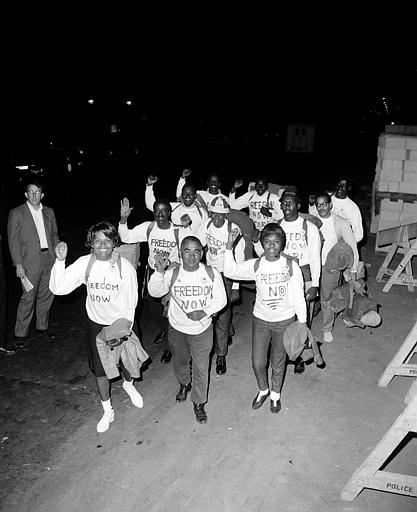 Brooklyn CORE members departing for the March on Washington in August 1963. “Night photo of Brooklyn CORE members walking to March on Washington,” corenyc.org, accessed August 22, 2013, http://www.corenyc.org/omeka/items/show/21
Brooklyn CORE members departing for the March on Washington in August 1963. “Night photo of Brooklyn CORE members walking to March on Washington,” corenyc.org, accessed August 22, 2013, http://www.corenyc.org/omeka/items/show/21The 1963 March on Washington had been years, if not decades, in the making. As early as 1941, civil rights and labor leader A. Philip Randolph began planning a "March on Washington" in order to demand better working conditions and opportunities for African Americans, as well as desegregation of the Armed Forces during World War II. Randolph's original march never took place - he called it off after President Roosevelt met some of these demands with Executive Order 8802. But a seed had been planted. The idea of a massive rally in Washington continued to germinate throughout the 1950s and early 1960s.
Randolph and civil rights leader Bayard Rustin began planning for what became the March on Washington for Jobs and Freedom in late 1962. Much had changed in twenty-one years. The Civil Rights Movement had grown more vocal and more organized, energized by a new generation of young activists including, of course, Martin Luther King Jr. As the movement expanded, so did violence and repression in the South. Civil Rights leaders became increasingly critical of what King called the "tokenism" of Washington politics - a strategy of offering smaller, local, and limited opportunities to only a few African Americans instead of putting the full weight of the federal government behind comprehensive Civil Rights legislation.
Activists in northern cities also began organizing to eradicate the endemic but less publicized racism that they, too, faced. Brooklyn CORE members were a new generation of activists. They embraced more radical and conspicuous techniques to bring attention to the injustices that black, Latino, and poor New Yorkers dealt with in their everyday lives - from housing and employment discrimination to unfair sanitation services in predominantly black neighborhoods. They proved savvy at making their demands and actions known through many outlets of New York media. So when it came time to participate in the March on Washington, Brooklyn CORE members did not simply attend. They publicly announced their intention to make the almost 250 mile trip on foot.
 Press release from Brooklyn CORE announcing the departure of members to the March on Washington, August 13, 1963; Arnie Goldwag Brooklyn Congress of Racial Equality collection, ARC.002, box 3, folder 16; Brooklyn Historical Society.
Press release from Brooklyn CORE announcing the departure of members to the March on Washington, August 13, 1963; Arnie Goldwag Brooklyn Congress of Racial Equality collection, ARC.002, box 3, folder 16; Brooklyn Historical Society.The experiences of the Brooklyn CORE members give us a personal glimpse into the March on Washington from a participant's point of view. Brooklyn Historical Society's Brooklyn Congress of Racial Equality archival collection (ARC.002) contains a treasure trove of documentation and ephemera from this historic event. We've pulled a few of our favorites below. To research in the Brooklyn CORE collection, you can visit BHS's Othmer library.
Or, if you'd like to read up on the history of the March on Washington and the Brooklyn CORE, take advantage of the wonderful new scholarship that has recently come out on these subjects, including Brian Purnell's Fighting Jim Crow in the County of Kings, and William P. Jones' The March on Washington.
[gallery ids="8987,8988,8989,8990,8991,8992">
This blog post reflects the opinions of the author and does not necessarily represent the views of Brooklyn Public Library.
Post a Comment
While BPL encourages an open forum, posts and comments are moderated by library staff. BPL reserves the right, within its sole discretion, not to post and to remove submissions or comments that are unlawful or violate this policy. While comments will not be edited by BPL personnel, a comment may be deleted if it violates our comment policy.
eNews Signup
Get the latest updates from BPL and be the first to know about new programs, author talks, exciting events and opportunities to support your local library.







